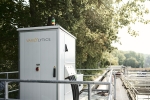Baden-Württemberg and its companies
Bioeconomy refers to the sustainable management of renewable natural resources, which is why there is no such thing as a bioeconomy industry in the traditional sense. However, there are companies in Baden-Württemberg that use biomass as raw material base and have already developed products and processes in their effort to act more sustainably
The energy producer badenova uses male corn plants to produce renewable natural gas (RNG). The company circumvents the food vs fuel conflict as the male plants are only used to pollinate female corn before being discarded. A company called TECNARO from Ilsfeld/Auenstein near Heilbronn has developed a technology that it uses to produce injection-mouldable plastics and fibrous materials from lignin. These materials are already being used in numerous products. The company fischerwerke has developed a wall plug that is partially produced from renewable resources. The wall plug is produced from two-component nylon, and one of the two components is produced from castor oil. Daimler AG's A-Class is equipped with an engine cover that is also produced with a plastic partially made from biological resources.
Companies not only face challenges relating to products, but also concerning innovative production processes. New methods and machines need to be developed in order to be able to use biomass sustainably on an industrial scale. This means that traditional sectors such as the mechanical engineering and plant construction sectors must be made aware and persuaded of the necessity and benefits of the bioeconomy.
Company profiles
-
The AlbLavendel project - 20/11/2023

Blue-violet, fragrant fields like those in Provence may soon become a common sight in the Swabian Alb. As part of the AlbLavendel project, the University of Hohenheim along with the company naturamus GmbH and the German Institutes of Textile and Fibre Research Denkendorf has started to investigate the cultivation of lavender, the production of essential oils and the use of distillation residues for producing textile fibres in the local region.
-
Climate-neutral wastewater treatment plants thanks to patented real-time analytics - 08/11/2023

The wastewater industry is responsible for global greenhouse gas emissions equivalent to those of global aviation. The start-up Variolytics has found a way to significantly reduce greenhouse gases in wastewater treatment plants using real-time analytics. The patented sensor technology and AI-supported process optimisation offer multiple benefits: in addition to reducing nitrous oxide, the system helps to reduce energy costs and resources.
Company foundations in the bioeconomy field
-
The AlbLavendel project - 20/11/2023

Blue-violet, fragrant fields like those in Provence may soon become a common sight in the Swabian Alb. As part of the AlbLavendel project, the University of Hohenheim along with the company naturamus GmbH and the German Institutes of Textile and Fibre Research Denkendorf has started to investigate the cultivation of lavender, the production of essential oils and the use of distillation residues for producing textile fibres in the local region.
-
Climate-neutral wastewater treatment plants thanks to patented real-time analytics - 08/11/2023

The wastewater industry is responsible for global greenhouse gas emissions equivalent to those of global aviation. The start-up Variolytics has found a way to significantly reduce greenhouse gases in wastewater treatment plants using real-time analytics. The patented sensor technology and AI-supported process optimisation offer multiple benefits: in addition to reducing nitrous oxide, the system helps to reduce energy costs and resources.
News of bioeconomic companies
-
Press release - 26/09/2023
Mobile units for processing fruit and vegetables on-site may play an important role in food supply in 2035. The EU’s FOX project investigated the form that such local food chains might take. To this end, Fraunhofer ISI developed future scenarios that could be used to test the viability of business models for regional food processing and distribution.
-
Press release - 25/09/2023
Autonomous and robust navigation is an essential capability for agricultural robots or machines that are to reach a new level of autonomy to manoeuver safely and reliably in their environment. Fraunhofer IPA will showcase what is currently technologically and economically feasible with live demos at agritechnica, the agricultural trade fair taking place in Hanover from November 12 to 18, 2023.
Website address: https://www.biooekonomie-bw.de/en/bw/stakeholders/companies

